You can offset the effects of time, dyes and medications
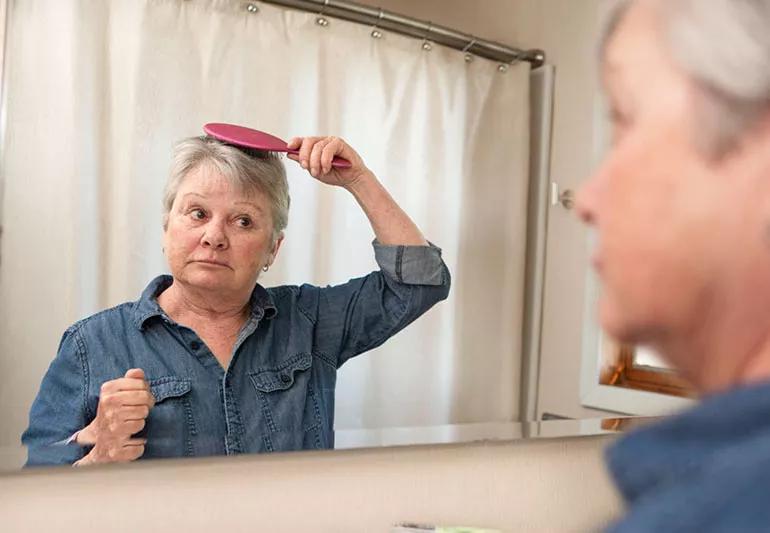
As you age, your body experiences many changes, and your hair is no exception. Hair naturally changes in color and texture over time. And to keep your hair looking good as you age, it needs special attention.
Cleveland Clinic is a non-profit academic medical center. Advertising on our site helps support our mission. We do not endorse non-Cleveland Clinic products or services. Policy
But first, let’s learn a little more about our manes.
Hair is made of protein strands. A single strand of hair has a normal life of about two to seven years. Hair grows an average of half an inch a month and six inches a year. Factors like age, diet, genetics and overall health determine how fast it grows and its health.
As hair ages, it has a shortened life cycle, with shorter, finer hair falling out. This hair is usually replaced with new finer hair. But over time, nearly everyone has some hair loss with aging. All sexes experience hair loss for a variety of reasons as they age, such as hereditary traits, endocrine disorders, thyroid disorders, reduced hormonal support and nutritional deficiencies.
In women and people assigned female at birth, menopause is a big player as they enter their 40s. Sex hormones that help stimulate follicle fibers are diminished and, frequently, there’s a slight dominance of testosterone. Because of these aging and environmental changes, some hair follicles stop producing new hair altogether. Over time, hair fibers become thinner and drop out, and unfortunately, they never regenerate.
Natural pigment (color) changes occur in hair as you age as well. Pigment cells stop producing as much, and eventually, your once thick, chestnut hair becomes thin, fine and gray. You schedule an appointment with your stylist for a color because what else is there to do? But then, you’re faced with damage from chemicals used in hair dye. It’s enough to leave anyone feeling crimped about their locks.
But there is hope!
“There are steps you can take before and after menopause to offset these natural changes,” says dermatologist Wilma Bergfeld, MD. “You can do a lot to strengthen and repair your hair for a thicker, more lustrous sheen.”
Dr. Bergfeld offers these tips to love your hair at any age:
How frequently you wash your hair really depends on the type of hair you have. But regardless of your hair type, in general, washing too frequently can cause hair to become dry and brittle. “Don’t overdo shampoo, but you should wash your scalp at least twice per week,” Dr. Bergfeld advises. Use the type of shampoo indicated for your specific hair type — normal, oily or dry.
Applying conditioner after shampooing your hair is essential to maintaining healthy locks. Conditioner is a vital hair care step that adds moisture to help replenish hair’s sheen and natural oils lost during shampooing. And volumizers work like a splint to strengthen each strand of hair, plumping it to provide more volume per strand.
If you decide to color-treat your tresses, it’s best to opt for a stylist to color your hair. A professional can help determine the safest dye to use for your hair type, and can provide tips on shampoos, conditioners and other hair products made specifically for color-treated hair.
It’s also wise to forego daily heat styling, such as with blow dryers, curling wands and flat irons. We all want to look our best, but cutting back on intense heat styling tools one or two days a week will help hair bounce back from the damage they inflict.
But if you must use heat-styling products, apply a heat protectant to hair prior to use. A heat protectant provides a protective coating between heated styling products and hair, and adds moisture to protect against damage during heat styling.
Also, avoid hair products that contain hormone-disrupting chemicals like parabens and phthalates commonly found in many hair products. But Dr. Bergfeld notes, “Having said that, the science does not substantiate that these cosmetic chemicals put you at any risk, as the natural environment and foods have a greater risk.”
You can’t control healthy locks by genetics or age, but you can help your hair by eating healthy. The old adage says, “You are what you eat,” and this is definitely true when it comes to your hair.
First, Dr. Bergfeld says to be sure you’re eating enough overall. “As you age, you start to eat smaller portions because your taste level goes down, and you become nutritionally deficient.” Be sure to include a variety of foods in your diet, too.
And because hair follicles are made of mostly protein, don’t skip this vital nutrient. A lack of protein has been linked to hair loss. Dr Bergfeld suggests women eat a little bit of low-fat, red meat a couple times a week. “This captures your protein and other vital nutrients.”
What’s more, she says with age, your thyroid slows down. “Patients get a little tired and think it’s old age, but they have mild iron storage anemia.” Eating low-fat red meat alleviates this iron shortage.
Other nutrient-rich foods for lush locks include:
Some medicines for conditions like heart disease or those used to lower lipids can affect your hair. If you’re concerned about hair loss, ask your doctor if any of the medications you take interfere with hair growth or loss, and ask for advice on how to help counteract negative effects.
“Some of these medicines can cause shedding of finer fibers,” Dr. Bergfeld explains. Also, when women stop hormone replacement medication, they should expect a fair amount of hair loss.
“There’s no one who has the hair at 60 or 70 that they had at 15,” Dr. Bergfeld says. “That’s why it’s important to take care of your hair as you age.”
Learn more about our editorial process.
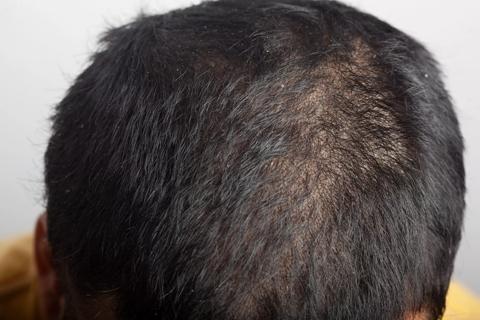
Calm an itchy scalp by using medicated shampoo, avoiding blow-drying and resisting the urge to scratch
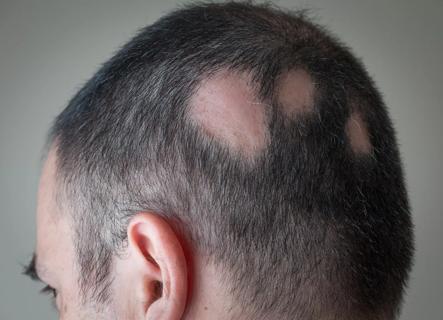
A gentle hair care routine, stress reduction and sun protection can help reduce flares and maintain your locks
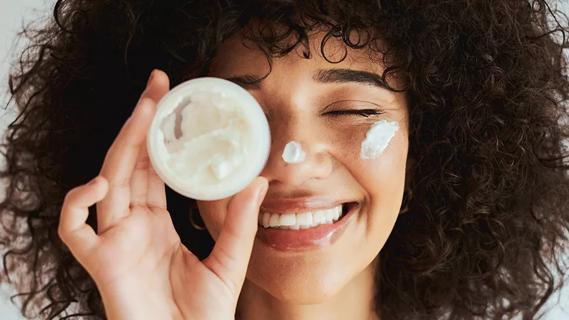
Pantothenol is a powerful moisturizer and can help repair damaged skin and hair
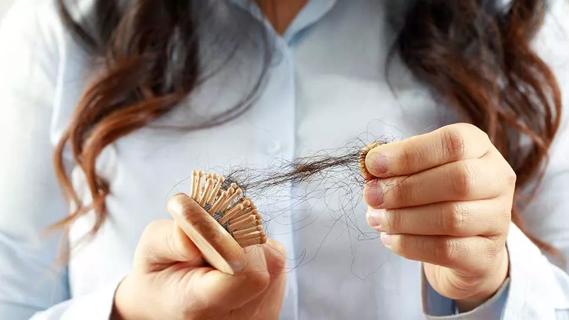
The endocrine gland in charge of hormone production may be causing your hair to shed or stop growing
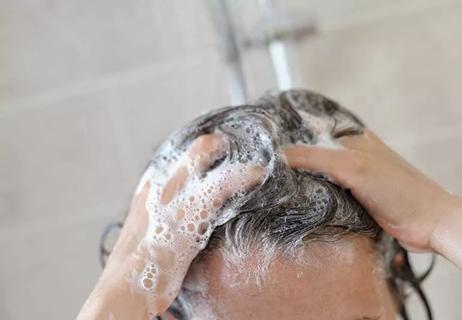
They can’t treat the cause of your hair loss, but some ingredients are better than others
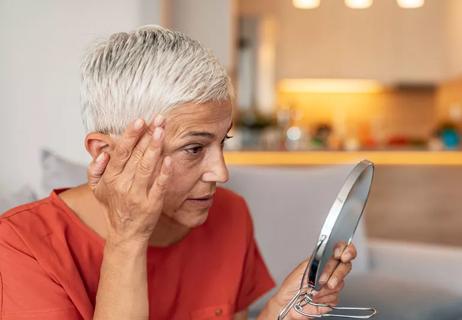
There’s a difference between hair loss and hair growth when it comes to biotin’s benefits

Iron, biotin and omega-3 fatty acids can help your strands
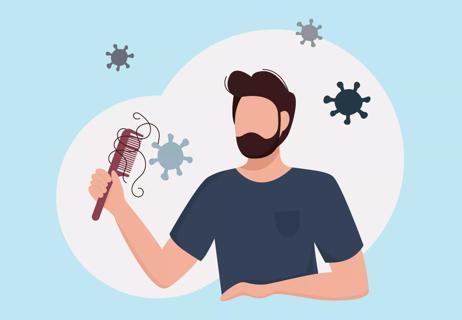
Illnesses can lead to hair loss, but it doesn’t last forever

Your metabolism may torch 1,300 to 2,000 calories daily with no activity

A gentle touch in all the right places may help drain your sinuses